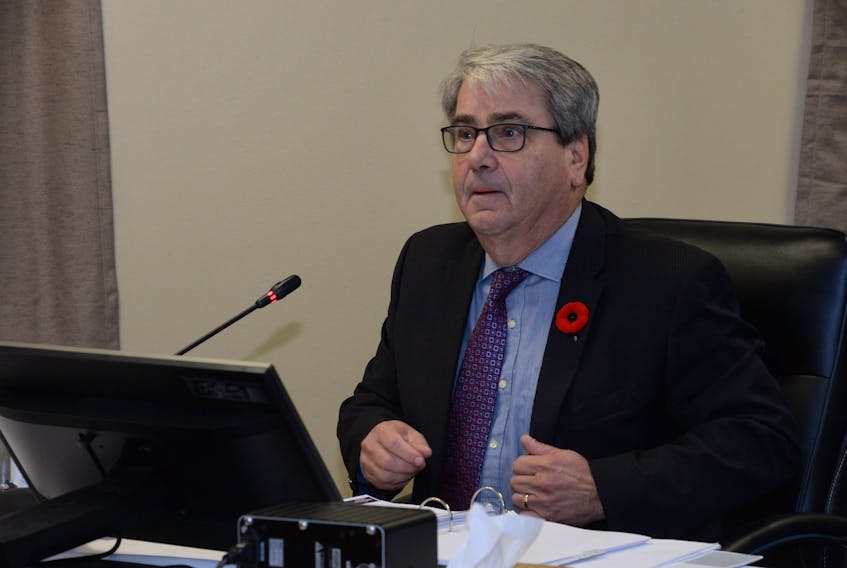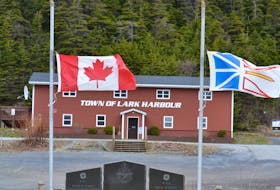A former deputy minister in the provincial Department of Finance, Terry Paddon, says he was not aware of any independent review of Nalcor Energy’s Muskrat Falls cost estimates before he left Finance in the months before the project’s sanctioning.
A review of project costs wasn’t a review the provincial government would have been capable of internally, he said, noting staff didn’t have the time or expertise to challenge the engineering and construction estimates.
Paddon also didn’t know of any outside consultants hired by the Department of Finance for that task.
Consultants who worked for Manitoba Hydro International (MHI) on a pre-sanction review for the government previously testified they didn’t challenge the detailed cost estimates as part of their review and, by the government’s direction, did not assess the overall business case.
Paddon was asked if he found it “worrying or troubling” there was no evidence then of independent review of the project’s costs.
“Probably in retrospect I do,” he told Muskrat Falls Inquiry co-counsel Barry Learmonth.
“I don’t think at the time there was as much concern. I think we understood that it was a big project, there was lots of moving parts.
“I think generally the province – officials in any event – took some comfort, is the right word, but from the fact that Nalcor had a reasonable amount of expertise, but they’d also hired expertise through companies like SNC-Lavalin, which had a fairly strong track record in terms of these types of projects.”
Paddon was named the province’s auditor general at the end of May 2012.
The Muskrat Falls project was sanctioned at the end of that year.
Paddon was also asked about an estimated $500 million recommended to be set aside for “strategic risk” on the project — separate from the project total being shared publicly.
While he was specifically named as someone who would know, he said it “doesn’t ring a bell” even now, although he was aware more generally of the need for the province to provide “contingent equity” to cover project overruns, without a specific amount on record.
“It’s a how long is a piece of string question, isn’t it?” he said on the contingent equity.
Paddon was asked by Learmonth about a report from auditors with Grant Thornton that said the project schedule as it stood at sanctioning was at a “P1” probability rating, with essentially no expectation of being met (something Harold Smith, representing Ed Martin, has suggested is in error, but for now remains on record).
Paddon said he hadn’t heard anything about that kind of schedule risk before his departure from Finance.
“You’d almost expect it to be the other way around,” he said, suggesting there should have been a very high degree of certainty about the project schedule by the time Nalcor Energy and the government were giving it the final go-ahead.
Under questioning from Nalcor Energy lawyer Dan Simmons, Paddon acknowledged the Department of Finance would not typically check cost estimates on construction projects, even projects falling within core government departments like a new school for Education. The suggestion was it would be natural for Finance not to dig into Nalcor’s estimates and instead rely largely on submissions and consultants to the Crown corporation.
When former Natural Resources minister Shawn Skinner was on the stand at the Muskrat Falls Inquiry on Friday, he said he presented papers to cabinet leading up to the project’s sanctioning that included comments related to project finances, on the faith that Finance had reviewed the numbers. Skinner said he never checked to make sure that was the case.
Paddon said the “Letter of Commitment” Skinner put forward and the premier ultimately signed could fairly be described as a “blank cheque” to Nalcor Energy, in committing ratepayers and taxpayers to cover the project costs.
Evidence introduced included a briefing note from Jan. 19, 2012 — one Paddon says he never saw before now, being an overview of public opinions on the economics of the project, including from, for example, economics professor Wade Locke and former Public Utilities Board chair David Vardy. The briefing note was attributed to three staff members in the Department of Finance — W. Tymchak, M. O’Reilly and K. Hicks.
The staff stated, “To ensure government is fully insulated from criticism and, more importantly, is absolved of any responsibility (to the extent that all current information allows) for potentially saddling the people of Newfoundland and Labrador with a massive unnecessary debt burden, government should delay a decision on Muskrat Falls for one to two years to allow a full assessment of alternatives and a complete analysis of the potential burden to taxpayers if development of Muskrat Falls has substantial overruns.
“This delay may cause postponement of some industrial development in Labrador, potentially lead to marginally higher borrowing costs and cause short-run price increases but that would be a small price to pay for ensuring all options and voices are fully assessed before reaching a decision on ‘the most important public policy issue ever to have faced Newfoundland and Labrador,’ as (David) Vardy and (Ron) Penney stated in their letter to The Telegram.”
There is, to date, no indication anyone but the authors saw the briefing note.
It was suggested in questioning that the statement was simply a summary from the public criticisms of the process to date, as opposed to a recommendation coming from the staff members.
Outside of the hearing room, Penney told reporters he read the briefing note as a statement from staff and said, even if higher ups did not see the note, staff should have been presented with open doors, to bring their concerns to more senior bureaucrats, as it was in his experience as deputy minister.
Meanwhile, in May 2011, along with former associate deputy minister in Natural Resources Charles Bown, Paddon did recommend an independent review of project costs and risks.
“I don’t know if the Manitoba Hydro review was considered to be this,” Paddon said, adding that was not as broad as what he was thinking.
While auditor general, Paddon did not have occasion to look at the financial analysis or decisions on the Muskrat Falls project pre-sanction. His office did start a look at Nalcor Energy in 2017, but made clear a forensic audit specific to the Muskrat Falls project was not being undertaken at that time. A forensic audit was awarded later to Grant Thornton, as part of the inquiry’s work.
Former premier Tom Marshall is scheduled as the next witness for the inquiry, expected on the stand in St. John’s Tuesday.
Twitter: @TeleFitz
RELATED STORIES:









